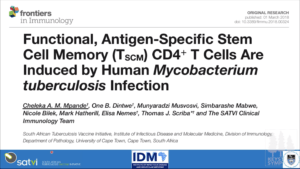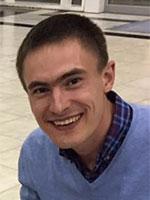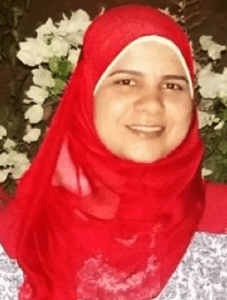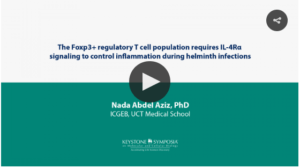Immunopaedia has a new partnership with Keystone Symposia, which aims at showcasing the research the ambassadors conduct. Immunopaedia ambassadors were invited to conduct visual recordings of their research for the Virtual Keystone Symposia:Science onDemand platform
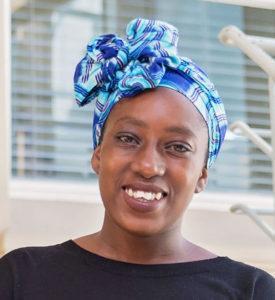 Cheleka Mpande
Cheleka Mpande
Cheleka is a PhD Student in Clinical Sciences and Immunology at South African Tuberculosis Vaccine Initiative, University of Cape Town. Her research focus is on Tuberculosis Immunology, particularly on understanding classical T cell memory, activation and functional kinetics during different stages of asymptotic Mycobacterium tuberculosis infection.
Cheleka recently presented a Virtual Keystone Symposium Sci-talk titled “Functional, antigen-specific stem cell memory (TSCM) CD4+ T cells are induced by human M.tuberculosis infection“, on work she co-authored in 2018.
“I am very grateful to be selected to be one of the speakers for the Immunopaedia-Keystone initiative. This is a great opportunity to present my research on a global platform, and increase my research exposure. This initiative is a wonderful to increase our Ambassadors exposure.”
Log in to the Virtual Keystone Symposium website to watch the video
Sergey Yegorov
Sergey is a recent Immunology PhD graduate from the laboratory of Dr. Rupert Kaul at the University of Toronto. His PhD research focused on endemic East African infections and HIV susceptibility. The central component of his thesis is a Uganda-based translational clinical trial, which he describes in his Sci-Talk. “Specifically, this study explored whether and how treatment of S. mansoni could affect HIV susceptibility in Ugandan women and I hope that the novel results from this work will open up new avenues for HIV prevention in the East Africa region.”
“I am thankful to be part of the Immunopaedia-Keystone initiative and think that this is a great opportunity for young scholars to showcase their work to a broad audience around the globe.”
The results of this research have also been recently published in Nature Communications this year.
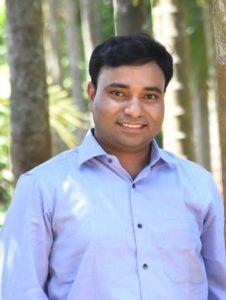 Rushikesh Patil
Rushikesh Patil
Rushikesh Patil from ACTREC – Tata Memorial Centre, India conducted his PhD research specializing in Tumor Immunology. His PhD journey was [a] “fascinating journey of six years revolutionizing my personality”. As a DST-INSPIRE Faculty, I am working on investigating the metabolic regulation of T cell function in cancer. Understanding the crosstalk of immune cells with tumor is necessary to device novel immunotherapeutic strategies. Sharing research findings is instrumental in knowledge advancement.
“I thank Immunopaedia for this opportunity to share my work on a global platform. Immunopaedia being a leader in Immunology education, we the ambassadors should contribute maximum to the Immunopaedia“.
 Thandeka Moyo
Thandeka Moyo
Thandeka Moyo completed a BSc with distinctions in Biochemistry and Microbiology and BSc (Honours) in Biochemistry from Rhodes University. She then completed both her MSc and PhD in Clinical Science and Immunology at the University of Cape Town.
For her postdoctoral studies at the National Institute for Communicable Diseases, Thandeka focuses on crystallization of antibodies/antibody fragments and their HIV antigens to aid in the design of effective HIV immunogens. Thandeka has expertise in protein biochemistry and HIV immunology. Her skills include protein purification and characterization, protein crystallization and in vitro assays including HIV pseudovirus-based assays and ELISAs. HIV vaccine research is vital for effective HIV prevention strategies as without a vaccine, the HIV incidence will not decrease at a fast enough rate to eventually eradicate the virus.
Dr Moyo presented a virtual talk on Keystone Sci-Talk entitled “Deciphering the molecular basis of unusually high neutralization resistance in a tier 3 HIV-1 strain”. It took her almost three years for all the work for this project to be completed with the help of many in the team. This opportunity is very important for her because the research of young scientists is very rarely showcased but this provides a platform for our science to be heard and offers openings for collaboration.
Words of encouragement to other ambassadors- “Choose a field you love which offers a wide range of transferrable and niche techniques. Consistently work hard and do not give up. Sometimes the results you do not expect turn out to be the greatest discoveries!”
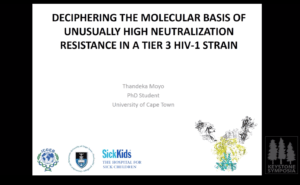 Login in to Virtual Keystone Symposia website to watch the video
Login in to Virtual Keystone Symposia website to watch the video
Nada Abdel-Aziz
Dr. Nada Abdel Aziz is ICGEB Arturo Falaschi Post-Doctoral Fellow, Faculty of Health Science, University of Cape Town. She is also Lecturer Assistant at Faculty of Science, Cairo University. Her scientific research is focusing on vaccine development against helminthiasis and identification of host factors crucial in helminth-induced immunopathology. Her passion for tackling helminth infection started almost 6 years ago with more emphasis on the role of regulatory T cells in the last 3 years. Dr. Abdel Aziz said that “it was a great opportunity to have a Virtual talk on a prestigious platform like Keystone as it helps to feature the hard work and to gain very good visibility and thus, I do encourage all the Immunopaedia ambassadors to go for it whenever they do have the chance”.
Dr. Abdel Aziz presented a virtual talk on Keystone entitled “Foxp3+ regulatory T cell population requires IL-4Rα signaling to control inflammation during helminth infections”
Login in to Virtual Keystone Symposia website to watch the video
